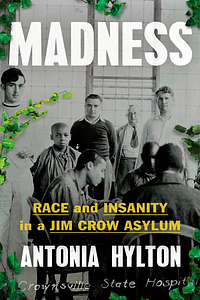You need to sign in or sign up before continuing.
Take a photo of a barcode or cover
challenging
dark
informative
reflective
sad
medium-paced
emotional
informative
sad
slow-paced
dark
emotional
informative
reflective
slow-paced
informative
reflective
sad
medium-paced
dark
informative
medium-paced
challenging
dark
emotional
hopeful
informative
sad
fast-paced
Graphic: Ableism, Chronic illness, Confinement, Mental illness, Racism, Suicide, Forced institutionalization, Medical content, Schizophrenia/Psychosis , Classism
Moderate: Addiction, Child death, Death, Drug use, Hate crime, Suicidal thoughts, Violence, Excrement, Grief, Fire/Fire injury, Abandonment
Minor: Alcoholism, Cursing, Drug abuse, Gun violence, Homophobia, Racial slurs, Sexism, Slavery, Blood, Police brutality, Abortion, Pregnancy, Alcohol
challenging
dark
tense
slow-paced
challenging
dark
emotional
informative
reflective
sad
fast-paced
Writing my review several days after I finished the book cause chile...I had to sit with my feelings after this one. Black psychiatry history has to leave a lot of room for lots of people. Black people who were poor, political active, and not in a specific idea of what someone thought a Black person should be as well as Black people who were in the wrong place at the wrong time because Crownsville, had all those people in there. But we also should not forget the Black people who were mentally ill whether we're talkong personality disorders, autism, depression, alcoholism/drug addiction, those who had mental and cognitive disabilities, those who had physical disabilities. The list is so long and they all had to deal with horrific abuse, and even having Black workers didn't mean those people were not complacent in causing harm (I do wish the book touched on that more but the fact that it was even brought up felt like a bit of a miracle knowing how psych industry works). I don't think this book left one stone unturned in regards to what it was trying to cover. I do wish it delved a bit deeper in some spots but, I liked it over all. There are different types of patients seen in here and I do think it's important to remember as many people who were not mentally ill or mentally disabled or physically disabled there were many who were and ALL of these ppl faced horrific abuse. Some of which we don't know the extent of because the records have been lost and the people are gone (they're still trying to recover these people's names). Shoutout to the people in the Annapolis community who kept these stories alive. I'm sure these people are so thankful for y'all. There's so much in here that broke my heart i mean from the way Black children have some of the worst mental health, the way a depressed child was basically left to die, the way that some people couldn't get better and passed away. The way some of the people interviewed said they see homeless people who used to be crownsvilles patients, people who were disabled because things like syphillis were going untreated for Black people (like the tuskeegee airmen if I remember correctly), Jordan Neely mention brought me to tears, Elsie Lacks being one of the patients who died and couldn't even go to her mother (Henrietta Lacks funeral), the negligence and abuse that is rampant in psych fields, the way people had to deal with ableism and racism, the way asylum paved the way for jails, the way Black peoples psychosis and paranoia were born out of real fears and I could go on and on. I got like 20 pages of phone notes. If I recommend one book related to psychiatry and how the industry treats Black patients its this one. Granted it's mostly about Crownsville which was in Annapolis Maryland but still. May everyone who's story we know and don't know from Crownsville rest in peace and may we one day know all their names and learn their stories. May we create a better world for those Black and Disabled.
challenging
dark
emotional
informative
inspiring
fast-paced
challenging
emotional
informative
reflective
sad
medium-paced





